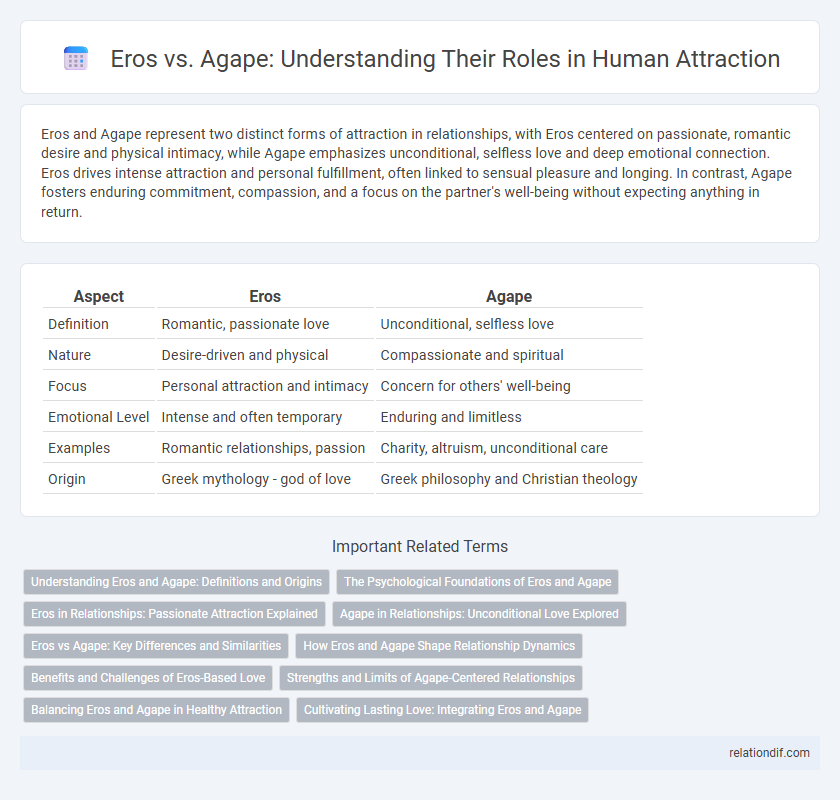Eros and Agape represent two distinct forms of attraction in relationships, with Eros centered on passionate, romantic desire and physical intimacy, while Agape emphasizes unconditional, selfless love and deep emotional connection. Eros drives intense attraction and personal fulfillment, often linked to sensual pleasure and longing. In contrast, Agape fosters enduring commitment, compassion, and a focus on the partner's well-being without expecting anything in return.
Table of Comparison
| Aspect | Eros | Agape |
|---|---|---|
| Definition | Romantic, passionate love | Unconditional, selfless love |
| Nature | Desire-driven and physical | Compassionate and spiritual |
| Focus | Personal attraction and intimacy | Concern for others' well-being |
| Emotional Level | Intense and often temporary | Enduring and limitless |
| Examples | Romantic relationships, passion | Charity, altruism, unconditional care |
| Origin | Greek mythology - god of love | Greek philosophy and Christian theology |
Understanding Eros and Agape: Definitions and Origins
Eros, originating from ancient Greek mythology, represents passionate, romantic love driven by desire and attraction, often linked to physical intimacy and emotional intensity. Agape, rooted in Christian theology, signifies unconditional, selfless love characterized by compassion and altruism, transcending personal gain or romance. Understanding these distinct forms of love reveals how attraction can stem from both physical desire and profound, selfless care.
The Psychological Foundations of Eros and Agape
Eros is rooted in desire and passionate longing, driven by physical attraction and the need for closeness, often linked to dopamine and oxytocin activation in the brain. Agape represents selfless, unconditional love, fostering empathy, compassion, and altruism, associated with activation in brain areas related to social bonding and moral reasoning. Understanding these psychological foundations reveals how Eros motivates intimate connection while Agape sustains enduring, compassionate relationships.
Eros in Relationships: Passionate Attraction Explained
Eros in relationships represents intense, passionate attraction characterized by desire and physical intimacy, often sparking the initial spark between partners. This form of love is rooted in sensuality and emotional excitement, driving romantic connections to a powerful and often transformative level. Understanding Eros helps couples navigate the complexities of passion and maintain emotional intensity over time.
Agape in Relationships: Unconditional Love Explored
Agape in relationships represents unconditional love characterized by selflessness, empathy, and unwavering support, fostering deep emotional bonds beyond physical attraction. This form of love transcends the passionate intensity of Eros by prioritizing long-term commitment, trust, and respect, essential for sustainable partnership growth. Studies in psychology highlight that couples experiencing Agape exhibit higher relationship satisfaction and resilience, underscoring its critical role in enduring love.
Eros vs Agape: Key Differences and Similarities
Eros represents passionate, romantic attraction driven by desire and physical connection, while Agape embodies unconditional, selfless love oriented toward care and compassion without expecting reciprocation. Both Eros and Agape involve deep emotional bonds but differ fundamentally in motivation and expression, with Eros seeking intimacy and Agape prioritizing altruistic concern for the well-being of others. Understanding these distinctions highlights the diverse ways love influences human relationships, blending desire and selflessness in complex interactions.
How Eros and Agape Shape Relationship Dynamics
Eros drives passionate desire and physical attraction, igniting intense emotional connections that often fuel the initial stages of relationships. Agape, characterized by unconditional love and selflessness, fosters deeper trust and long-term commitment, promoting stability and mutual support. Together, Eros and Agape create a balanced dynamic where both physical intimacy and enduring care sustain relationship growth.
Benefits and Challenges of Eros-Based Love
Eros-based love generates intense passion and physical attraction, fostering deep emotional connections and heightened intimacy between partners. This form of love often drives excitement and desire but can also lead to challenges such as jealousy, possessiveness, and emotional volatility due to its reliance on physical and romantic intensity. Balancing Eros with mutual respect and communication helps mitigate these challenges, promoting a healthier, more sustainable relationship dynamic.
Strengths and Limits of Agape-Centered Relationships
Agape-centered relationships emphasize unconditional love, fostering deep emotional resilience and selflessness that strengthen long-term bonds. Their strength lies in promoting empathy and forgiveness, encouraging partners to support growth beyond personal desires. However, limitations include potential self-neglect and imbalance when one partner's needs are consistently subordinated to maintain harmony.
Balancing Eros and Agape in Healthy Attraction
Balancing Eros and Agape in healthy attraction involves integrating passionate desire with selfless love, creating a relationship rooted in both physical connection and deep emotional support. Eros fuels intimacy and excitement, while Agape fosters trust, respect, and unconditional care, ensuring a sustainable bond. Prioritizing both energies leads to harmonious partnerships where attraction thrives on mutual fulfillment and genuine compassion.
Cultivating Lasting Love: Integrating Eros and Agape
Eros, characterized by passionate desire and physical attraction, ignites the initial spark in relationships, while Agape embodies selfless, unconditional love that fosters deep emotional connection and commitment. Cultivating lasting love involves balancing Eros' intensity with Agape's compassion, creating a relationship that thrives on both physical intimacy and mutual respect. Integrating these forms of love nurtures trust, empathy, and enduring affection, essential components of a sustainable partnership.
Eros vs Agape Infographic

 relationdif.com
relationdif.com